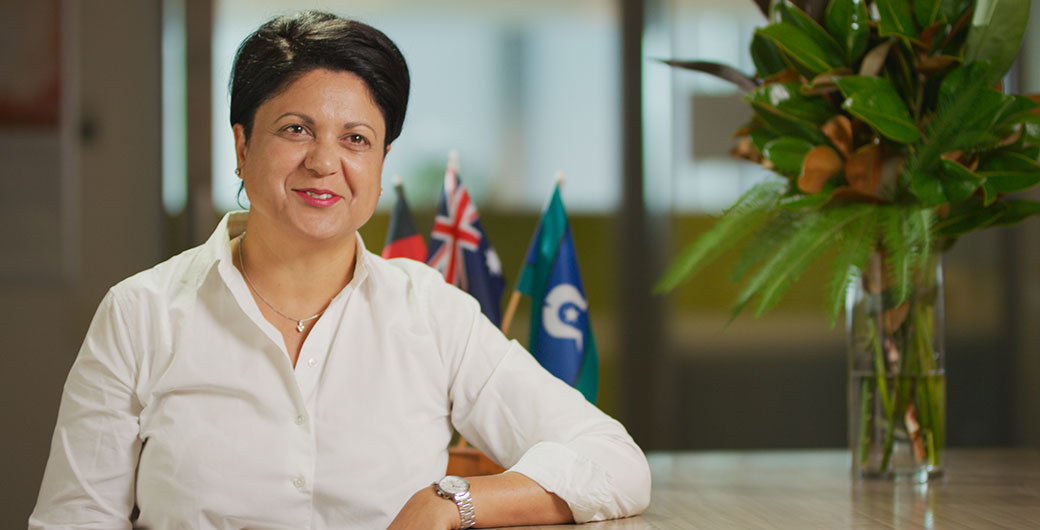
Paulleen Markwort was the first in a family of 10 children to finish high school. It’s just one milestone in the journey which has led her to a life dedicated to making a difference for vulnerable Aboriginal people.
NAIDOC Week begins this week, with celebrations held across Australia to highlight the history, culture and achievements of Aboriginal and Torres Strait Islander peoples.
This year the focus is on the positive role that Indigenous women have played, and continue to play, across Australian society, including our public services.
Paulleen’s Aboriginal heritage comes from her mother, connecting her to two of Australia’s biggest Aboriginal nations – Wiradjuri (Griffith, NSW) and Iningai (Longreach, QLD stewardship).
Her paternal family (Markwort) originated from Germany, beginning life in Victoria and making their home in Forbes, NSW in early 1920.
She said that many other Aboriginal people were seeing the benefits of education, and using it to help their communities.
“It’s never too late to learn, I was the first in my family to finish high school, and we’ve now had other people in our family go on to university,” she said.
Paulleen, who currently works in the Victorian Department of Health and Human Services, as a Specialist Adviser for Aboriginal Reform Projects, credits an ANZSOG Executive Master of Public Administration (EMPA) as providing the tools she needed to effect change in the public sector.
Over the past six months Paulleen has successfully supported the design of the children and families united services system proposals.
This involved creating and implementing an approach to designing with Aboriginal communities which demonstrates that Aboriginal self-determination can be a prevailing design when working with Aboriginal people.
Labelled as “trailblazing” the approach included a series of design yarns with Victorian Aboriginal clients and workforce.
“The design yarns are a platform for Aboriginal voice, giving people opportunities to contribute to policies that affects them is critical to self-management and self- determination”.
Paulleen has used these design yarns to embed Aboriginal voice across all children and families reform proposals and keeping a focus on Aboriginal self-management and self-determination.
She says that her experience as part of the 2016 EMPA cohort was a key milestone in her public service journey.
“Part of my desire to do the ANZSOG course was because I wasn’t trained in government. I’m a teacher; so I was learning on the job about government processes, how the system works, and what sort of influences you need to have,” she said.
“I couldn’t seem to break through and increase my ability to effect change. I spoke to the People and Culture team and they suggested there’s some ANZSOG programs that I might like to consider. I spoke to a couple of mentors and they said there is no reason you can’t do it, so I put in an application.”
She found the EMPA program, with its emphasis on extending participant’s skills and providing a framework for thinking more deeply and strategically, gave her the tools she needed to work within the public sector.
“ANZSOG has just given an expanded skillset and has enhanced what was already there, it has also given me the confidence to actually engage in conversations with people of all senior levels,” she said.
“I now understand how to navigate those relationships, identify the right levers and act on windows of opportunity, for the benefit of the people I’ve been trying provide a platform for, which is vulnerable Aboriginal people.
“Now, I truly understand what my purpose is, and I feel like I can be placed in a role and add value.”
DHHS Deputy Secretary, Children and Families Reform, Argiri Alisandratos, said that the EMPA had helped Paulleen grow.
“Development and capability has been the most important element of the growth that she has been able to achieve,” he said.
“That’s why we send staff to ANZSOG courses. Because we want to grow our leadership capabilities, we want to develop future leaders.”
Paulleen has been involved in key policies across Victorian government, including: Community Services Workforce, Support and Safety Hubs, design of Safety and Quality Office, Aboriginal Children in Aboriginal Care, Aboriginal Children’s Forum, Addendum to the DHHS Standards Evidence Guide, The National Aboriginal and Torres Strait Islander Health Plan 2013-2023, Cancer Australia Strategic Plan, Family-led Decision Making program, Cultural Support Plan program, Out of Home Care Outcomes Framework, Permanency Care legislation, Youth Policy Framework, Betrayal of Trust Safety Standards, Taskforce 1000, Review of Placement Prevention and Reunification Services to Aboriginal children and their families, Kinship Care Guidelines and Beyond good Intentions, Roadmap to Reform, Cultural Support Plan Project Advisory Group, No Jab no Play, L17 (Family Violence) Project.
